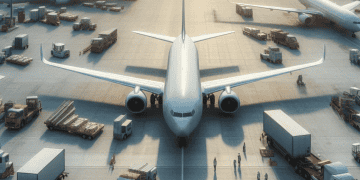Airline executives have expressed concerns that supply chain disruptions will continue to affect the industry for an extended period. These challenges, which have been exacerbated by the COVID-19 pandemic, include delays in aircraft production, parts shortages, and logistical bottlenecks.
During recent industry discussions, leaders highlighted that the recovery from these supply chain issues is likely to be protracted. They emphasized the significant impact on airline operations, including the delayed delivery of new aircraft and the prolonged grounding of existing fleets due to a lack of essential components.
One of the primary issues identified is the backlog in aircraft manufacturing. Major manufacturers are struggling to keep up with demand due to disruptions in the supply of critical parts. This situation has been further complicated by workforce shortages and logistical challenges in transporting parts and completed aircraft.
In addition to manufacturing delays, the aviation sector is facing difficulties in maintaining and repairing aircraft. The scarcity of spare parts has resulted in longer turnaround times for maintenance, affecting the availability of aircraft for operations. This issue is particularly acute for airlines operating older fleets, which require more frequent and intensive maintenance.
Logistics disruptions have also played a significant role in the ongoing supply chain challenges. The global shipping industry has faced unprecedented congestion and delays, impacting the timely delivery of aircraft parts and materials. This has led to increased costs and operational inefficiencies for airlines striving to maintain their schedules.
Despite these challenges, airline leaders remain cautiously optimistic about the future. They are exploring various strategies to mitigate the impact of supply chain disruptions. These include diversifying their supplier base, investing in advanced technologies for predictive maintenance, and collaborating more closely with manufacturers to ensure a smoother flow of parts and materials.
The long-term outlook suggests that while the aviation industry will continue to grapple with supply chain issues, ongoing efforts to enhance resilience and adaptability are expected to yield positive results. However, the path to recovery is likely to be slow and fraught with complexities.
In conclusion, the persistence of supply chain challenges poses a significant hurdle for the airline industry. Addressing these issues will require concerted efforts from all stakeholders, including manufacturers, suppliers, and logistics providers, to restore stability and efficiency to the sector.
Get top supply chain report news on The Supply Chain Report. For international trade insights and tools, visit ADAMftd.com.
#AirlineSupplyChain #AviationChallenges #AircraftManufacturing #SupplyChainDisruptions #AviationLogistics #AircraftPartsShortage #IndustryRecovery #AirlineOperations #SupplyChainIssues #AviationIndustry #LongTermChallenges #SupplyChainManagement #AviationNews #LogisticsBottlenecks #AirlineLeaders #MaintenanceDelays #AircraftProduction #COVID19Impact #LogisticsChallenges #AviationUpdate















